Shadow Order
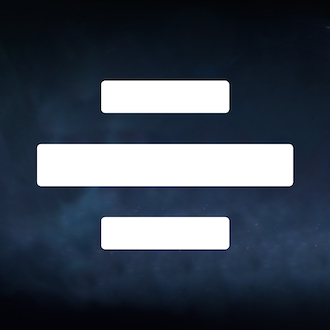
| |
| Shadow Ørder | |
|---|---|
| Game | Jedi Academy |
| Mod | Base |
| Type | Casual |
| Founded | 2016 |
| Years Active | 2016-2018 |
| Leader | Circa |
| Website | shadoworder.com |
Shadow Order (seen also as Shadow Ørder, SØ, -=-) was a basejka clan that originated in the PC version of Star Wars: Jedi Knight - Jedi Academy. Its primary purpose was to host a casual community experience in the base community, complete with a ranking system, events, trials, and training. At the time, there were no casual groups in basejka, and Shadow Order championed the role of a place where any fans of the pure basejka game can hang out without a focus on competitive PUGs or tournaments as the focus. The clan did host a series of competitive events, such as ladders, clan matches, etc. but the main focus was casual play.
Members used the tag -=- to indicate their membership. Trial members (Jedi Trainee rank) used the tag -=/=- to indicate their trial status before they were granted membership. Later, the main tag was changed to -I|I- or -!¡!- to match what was used in games outside of Jedi Academy.
History
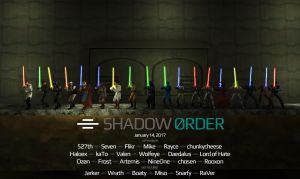
Shadow Order was formed by Circa aka "Valen" in 2016. The first members to apply and join were Scorpion, Daedalus/Blackout, swegmaster, 527th, and Rooxon. The clan grew fast, reaching around 35 members at its peak. They recruited from various communities, basejka and JA+ servers. Many members stuck around for a long time and became central to keeping the clan active, fun, and structured such as Wolfeye, Artemis, Frost, NineOne, Haloex, and Dzon (and many more). After a couple years, keeping up with the clan grew difficult while balancing real life and other games, dealing with clan drama, and lack of interest from members, according to Circa.[1]
Ranks
Ranks in Shadow Order changed a few times due to member feedback and growth. Originally there were 4 ranks: Grand Master, Jedi Master, Jedi Knight, and Jedi Padawan. As more people joined, demand for more ranks and responsibilities rose. The ranking system ended up being as below around the time of disband.
| Rank | Role | Responsibilites |
|---|---|---|
| Grand Master | Leader/admin | Lead the clan, plan events, moderate the server, resolve any issues |
| Shadow Council | Council leaders | Help with leading, planning events, moderating, resolving any issues |
| Jedi Knight | Advanced members | Members that have been around a long time and wanted to train in a subrank |
| Assassin | Focused on saber combat, training, teaching (taking on a Padawan, teaching a class), and leading a team for TFFA competitive events | |
| Shadow | Focused on event planning and inter-clan relations and matches | |
| Jedi | Active members | Members that have been around and active for a decent amount of time but don't want anything beyond membership |
| Sentinel | Focused on saber combat, training and participating in TFFA competitive events | |
| Consular | Focused on event planning for the clan's members only | |
| Jedi Padawan | New members | Members that completed their recruitment trial and are freshly new members |
| Jedi Trainee | Recruits | Players that have applied for membership and are undergoing an activity trial to see if they'd be a good fit for the clan |
Server
The Shadow Order server ran on a custom fork of OpenJK called basejka+. Though not technically pure base, the goal was to be as close to basejka as possible. This custom fork implemented a few new features like the base emotes (meditate, flourish, gloat), private duel health restore, rcon enabled cheats, and idle animation disable.
The server always ran under the name ...-=- SHADOW ØRDER in the server browser. It implemented the JKHub jk3.in shortening service, so the IP was always found with so.jk3.in.
The default mode was always set to FFA with a map rotation of base maps, making sure anyone can easily join. Occasionally it would get set to TFFA during events or if people were feeling like doing some quick PUGs.
Clan Maps
Shadow Order had a few clan maps. The main one was called "Shadow Fortress" and was not finished. It took place on Coruscant at night, and was meant to be a hidden temple, with all of the necessary rooms for the various events that took place in the clan. At the time of disband, there were only 5 areas: Tag Team arena, 3 dueling rooms, training room, and outside courtyard.
Other maps included 3 trial maps, that were used for Padawan, Jedi, and Jedi Knight trials.
Trials
The trials of Shadow Order were mainly focused on fun, but also some slight challenge, depending on the rank it was for. Lower ranks had easier, more fun trials. High ranks were more involved. Each trial was usually split into 3 phases.
Padawan Trial
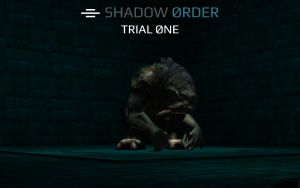
The trial for becoming a Padawan from a Trainee was the easiest. Phase I involved a few simple questions asking how they were liking the clan so far and their goals. Phase II was a quick quiz with very simple combat and gameplay related questions. Phase III was a small map that the player had to navigate through, fighting a handful of NPCs, and at the end was a rancor. Failing the trial was not technically possible, as leadership was to be as helpful as possible after the 5th try. The goal was to be fun and maybe educational to new players.
Jedi Trial
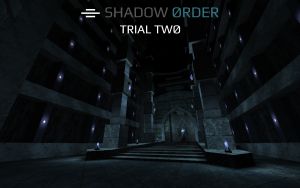
The trial for Jedi was slightly more difficult but still focused on being a fun challenge even for new players. Phase I was more questions, most related to treating others with respect and how they felt about their future in the clan. Phase II was an essentially an essay section, giving hypothetical situations and asking how they would handle it, such as new players joining the server or two members arguing. Phase III was another trial map, must kill all NPCs and get to the end in 30 minutes or less. There were two sides of the map, one with NPCs to kill, and the other with a small movement defrag course. Failure meant they must wait 2 weeks to re-trial.
Consular Trial
Consular was a sub-rank of Jedi, focused on event hosting, so the trial involved Phase I being answering more hypotheticals focused on that. Phase II was a mock event, where only a select number of council and members would attend and give the host a few common issues to work through, such as cheating, complaining, etc. How the host reacts and deals with each issue was evaluated by the council. Phase III was an actual event, that was evaluated based on how smoothly it went and how receptive to feedback they are. Failure meant re-trialing in 2 weeks.
Sentinel Trial
Sentinel was a sub-rank of Jedi, focused on saber combat and movement, so the trial involved Phase I being completing the map called "Movement" in under 30 minutes. Once they get to the end, they must do it again in under 10 minutes. Phase II was then a series of questions related to combat and movement, showing they know how the basic systems work and how to articulate them in words, not just play. Phase III was asking how they would instruct a new player on how to make their game run smoother. If the results of this phase were unsatisfactory, a fourth phase could be implemented as a duel in a race to 10 with another Sentinel or higher, while spectators (Sentinel or higher) give pointers on how they could improve as a duelist. If the trialee was an apprentice, their master would be the one to duel them and give the most pointers.
Jedi Knight Trial
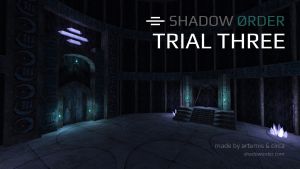
Going from Jedi to Jedi Knight is similar to the Jedi trial. Phase I involved more in-depth questions. Phase II was another trial map. Getting this rank outside of the sub-ranks is difficult but still more focused on fun.
Assassin Trial
A higher tier than Sentinel, this trial really challenges your knowledge and skill. Phase I was focused on combat related questions. Phase II was focused on defrag/strafing related questions. Phase III was another combat evaluation, with a race to ten. If they have a master, they duel their master again. The evaluation is much more critical on small things like footwork, mouse movement, aiming, blocking, parrying, etc.
Shadow Trial
A higher tier than Consular, this trial challenges your ability to plan, mediate, lead, and mod for the game. Phase I involved hypotheticals focused on events and diplomacy, as well as mediation. Phase II asked modding related questions. Phase III involved the trialee to choose either a large mod project (clan map, skin or model for a member, cosmetic, etc.), a media project (video, graphic, etc.) or an event planned with another clan (TFFA, instabig, CTF, etc.). This rank allows for many different skills to be utilized outside of combat to benefit the clan.
Jedi Master Trial
This trial was never completed, and the rank itself was eventually removed.
Shadow Council did not have a specific trial, as those ranks were attained on a case-by-case basis.
Events
Shadow Order put on a ton of events, both for the public and exclusive to members. A variety of competitive and casual events were held every month.
Shadow Cup
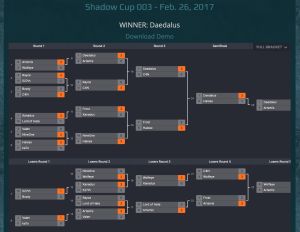
A (usually) monthly duel tournament[2] that had a ladder. Each month the winner was given a badge on their website profile and the ability to have a gold star * in their name in-game. There were 13 total Shadow Cups in the 2 years of the clan. Whomever won the next cup got the star in their name and the last winner had to remove it until they won it again. If there was a small number of participants, the host may choose to do Double Elimination, in which case all the losers from the first bracket get a second chance to win. Winners of both brackets will duel for the final round. First player to win 3 duels moves on. If you lose, you're out of the tournament and you will respectively spectate.[3]
Tag Team
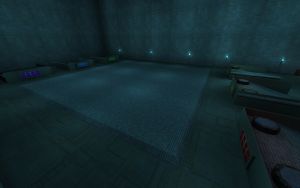
A mix between FFA and TFFA where your team gets assigned a lightsaber color, and one person from each team enters the arena, while the remaining teammates stay on the sidelines (usually in their colored booth) until the active member either dies or returns to the booth to "tag" the next team member in. Last team to survive wins the round. Typically the first team to win 5 rounds wins the event. Teams are decided by the host, depending on the skill gap between players. Best played on a map that has a dedicated Tag Team arena, like Shadow Fortress.[4]
Infected
A classic mode where one person starts as "infected" and tries to "infect" the survivors until either all survivors are infected, or the time runs out and the survivor(s) win. This is typically played on dark maps (Eravana, Zombie Tunnels) with lots of corridors. Players are greatly encouraged to keep r_gamma below 1.3. Infected players must use the dedicated infected skin, and a lightsaber on at all times. All survivors must keep their lightsaber off at all times. Survivors are not allowed to attack infected, in the traditional version of this game. It is all about movement and hiding. The host of this game acts as the referee to make sure nobody is cheating. Every few minutes the host must called "SWITCH" in the chat and make sure everyone moves from their hiding place to a new spot, to keep the game from taking too long by someone that found a crazy hiding spot. Host can decide if jumping is allowed or not, depending on the skill gap of the players. Traditionally no jumping is allowed, so you must rely on hiding and evading by running.
Medic!
This event is similar to Tag Team or King of the Hill, but it is played on a map that has a dedicated platform (Naboo Plaza) with a pit underneath it for an added risk of falling. All players line up outside the platform in a single file. The first two players in line enter the arena and begin to duel. The first person that gets hit by a lightsaber once must go to the back of the line, and the next person in line joins the arena, and so on. Everyone must start the event with full health and shields, but never fill it back up after the start using medpacks or anything. Last person to survive wins. Of course hunting down a person after they attempt to leave the arena is prohibited, and poaching from the line is also prohibited. The people with the best footwork typically prevail.
Shadow League
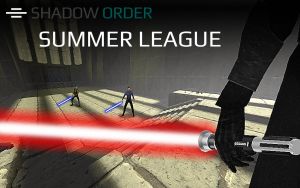
A seasonal TFFA tournament where members form a team to compete against each other in a season-long ladder. Depending on number of participants, this could have been teams of 2 or 3. Members would decide on their teams and sign up ahead of time to ensure even teams. Council and Shadow ranks would help facilitate teams for those that struggled to pair up with someone. Teams came up with a team name and logo. Depending on number of participants, there were two divisions, teams were split into divisions based on skill. Both divisions would schedule and play their match with at least one referee (a Jedi Knight rank or higher) present. Results were reported and each ladder progressed according the system. Eventually the winner of each division will compete to decide the ultimate winning team of the season. Teams could carry over to the next season or they could ultimately change depending on circumstances.[5] Only one of these events was held but never finished due to lack of interest.
Legacy
The Shadow Order clan is revered by many as bringing much needed activity back to the base community. The server remains up today for anyone to play on, to still serve as a casual meet-up spot for those that used to be in the clan or to anyone that wants a more pure or base experience.
Notable Members
In order of join date:
- Valen (Circa)
- Blackout (Daedalus)
- Rooxon
- swagmaster
- 527th
- Wolfeye (Xarious)
- Mike/Tony
- Rayce
- Haloex
- Flikr
- Seven
- Wrath
- chunkycheese
- Kyoz
- Jarker
- Boaty
- Artemis
- Frost
- Snarfy
- Miso
- NineOne
- chosen
- RaVer
- Lord of Hate
- kaTo
- Dzon
- Lelouch
- Xanadus
- Sidarious
- radeous
- Ragnar
- C4N
- Scalanek
- Voorhees Curse
- Kwiat
- Phantom/Batman
- IronOracle
- Bucky
- OwnedSage
- Link
- DeskGnome
- MagSul